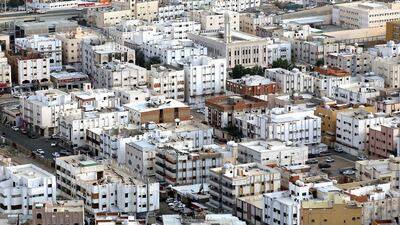The Saudi Arabian government is proposing a raft of measures aimed at boosting the country’s undersupplied housing market as part of its National Transformation Plan.
This week Saudi Arabian officials started to flesh out the plan aimed at reducing the country’s reliance on oil revenue following the 2014 oil price crash after the cabinet approved the blueprint on Monday.
The plan includes a target to increase the contribution of the property industry to the country’s GDP from 5 per cent to 10 per cent – equating to about US$74.8 billion – and pushing up the contribution of property financing to non-oil GDP from 8 per cent today to 15 per cent by 2020.
Under the new blueprint, published under the auspices of the deputy crown prince Mohammed bin Salman, the Saudi ministry of housing will be tasked with increasing the annual growth rate in the property sector from about 4 per cent today to 7 per cent in four years’ time.
Along with building more housing, Saudi officials also hope to make it cheaper for Saudi citizens to buy homes as part of a push to provide affordable housing. Brokers estimate that 400,000 “affordable homes” would be required to satisfy demand from middle-income households earning between 6,000 Saudi riyals (Dh5,875) and 20,000 riyals a month – two-thirds of the population.
The new plan aims to reduce the cost of housing from what averages out as roughly 10 times gross salaries to just five times by the year 2020.
The ministry will be required to increase the percentage of Saudi families owning their own homes to 52 per cent by the year 2020 from today’s 47 per cent.
One of the ways it hopes to achieve this is by providing housing subsidies for Saudi families, enabling them to take out mortgages – something the report reckons will reduce waiting times for housing finance from an average of 15 years today to just five years by 2020.
Moreover, the ministry will be asked to reduce the average time required to approve and licence new housing projects down to just two months from more than two years. (According to the document, the average building permit for housing in the kingdom takes 730 days.)
The plan also aims to increase the number of homes built by approved property developers in the country from 10 per cent of new housing stock to 30 per cent.
But despite the headlines, many of these targets appear to be nothing new. The Saudi Arabian government has increased its efforts to build more affordable housing since the Arab Spring in 2011 and a “white land” tax last year made it more expensive for owners of urban land to keep it empty in the hope of making a large profit from price hikes.
Knight Frank estimates that just 30 per cent of Saudis own their own homes compared with a global average of 70 per cent.
Data from the Saudi Real Estate Development Fund reveals that while property loans trended up sharply from 2012-14, the rate of growth slowed throughout last year.
Earlier this year the government eased strict new loan-to-value ratios for mortgages that had required buyers to make a 30 per cent down payment in a market where most people cannot afford their own home.
Nevertheless, property brokers were quick to welcome the measures.
“At Colliers we have been 20 years at this and honestly we can see the difference. What I’m telling you now is what we are seeing every day. I’m not saying that the phone is ringing off the hook, but we are talking to investors and to landlords and they can see that there is a political will to change things, which will translate into huge opportunities in the Saudi property market,” said Imad Damrah, the managing director of Colliers’ office in Saudi Arabia.
“What’s different this time is that the government has already passed a law to prevent land speculation, so now developers are keen to tackle these problems because they have the incentive to do so,” he added. “Now we can see agreements being signed and everyone is serious.”
Jamil Ghaznawi, the head of the JLL office in Saudi Arabia, is a little more measured in his enthusiasm.
“This is definitely a first step in the right direction. The big difference here is that the government is changing strategy from building houses itself to collaborating with developers to build on government land,” he said.
Read the full National Transformation Program here.
lbarnard@thenational.ae
Follow The National's Business section on Twitter

